Samsung SPH-M840 (Virgin Mobile) User Guide
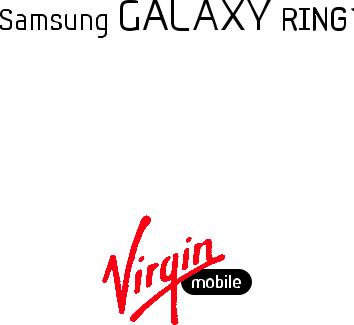
A N D R O I D S M A R T P H O N E
User Guide
Please read this manual before operating your phone and keep it for future reference.
Intellectual Property
All Intellectual Property, as defined below, owned by or which is otherwise the property of Samsung or its respective suppliers relating to the SAMSUNG Phone, including but not limited to, accessories, parts, or software relating there to (the “Phone System”), is proprietary to Samsung and protected under federal laws, state laws, and international treaty provisions. Intellectual Property includes, but is not limited to, inventions (patentable or unpatentable), patents, trade secrets, copyrights, software, computer programs, and related documentation and other works of authorship. You may not infringe or otherwise violate the rights secured by the Intellectual Property. Moreover, you agree that you will not (and will not attempt to) modify, prepare derivative works of, reverse engineer, decompile, disassemble, or otherwise attempt to create source code from the software. No title to or ownership in the Intellectual Property is transferred to
you. All applicable rights of the Intellectual Property shall remain with SAMSUNG and its suppliers.
Open Source Software
Some software components of this product incorporate source code covered under GNU General Public License (GPL), GNU Lesser General Public License (LGPL), OpenSSL License, BSD License and other open source licenses. To obtain the source code covered under the open source licenses, please visit:
http://opensource.samsung.com.
Disclaimer of Warranties; Exclusion of Liability
EXCEPT AS SET FORTH IN THE EXPRESS WARRANTY CONTAINED ON THE WARRANTY PAGE ENCLOSED WITH THE PRODUCT, THE PURCHASER TAKES THE PRODUCT "AS IS", AND SAMSUNG MAKES NO EXPRESS OR IMPLIED WARRANTY OF ANY KIND WHATSOEVER WITH RESPECT TO THE PRODUCT, INCLUDING BUT NOT LIMITED TO THE MERCHANTABILITY OF THE PRODUCT OR ITS FITNESS FOR ANY PARTICULAR PURPOSE OR USE; THE DESIGN, CONDITION OR QUALITY OF THE PRODUCT; THE PERFORMANCE OF THE PRODUCT; THE WORKMANSHIP OF THE PRODUCT OR THE COMPONENTS CONTAINED THEREIN; OR COMPLIANCE OF THE PRODUCT WITH THE REQUIREMENTS OF ANY LAW, RULE, SPECIFICATION OR CONTRACT PERTAINING THERETO. NOTHING CONTAINED IN THE INSTRUCTION MANUAL SHALL BE CONSTRUED TO CREATE AN EXPRESS OR IMPLIED WARRANTY OF ANY KIND WHATSOEVER WITH RESPECT TO THE PRODUCT. IN ADDITION, SAMSUNG SHALL NOT BE LIABLE FOR ANY DAMAGES OF ANY KIND RESULTING FROM THE PURCHASE OR USE OF THE PRODUCT OR ARISING FROM
VMU_SPH-M840_UG_Eng_MD7_TE_050813_F3
THE BREACH OF THE EXPRESS WARRANTY, INCLUDING INCIDENTAL, SPECIAL OR CONSEQUENTIAL DAMAGES, OR LOSS OF ANTICIPATED PROFITS OR BENEFITS.
Modification of Software
SAMSUNG IS NOT LIABLE FOR PERFORMANCE ISSUES OR INCOMPATIBILITIES CAUSED BY YOUR EDITING OF REGISTRY SETTINGS, OR YOUR MODIFICATION OF OPERATING SYSTEM SOFTWARE.
USING CUSTOM OPERATING SYSTEM SOFTWARE MAY CAUSE YOUR DEVICE AND APPLICATIONS TO WORK IMPROPERLY. YOUR CARRIER MAY NOT PERMIT USERS TO DOWNLOAD CERTAIN SOFTWARE, SUCH AS CUSTOM OS.
Samsung Telecommunications America (STA), LLC
Headquarters:
1301 E. Lookout Drive
Richardson, TX 75082
Customer Care Center:
1000 Klein Rd.
Plano, TX 75074
Toll Free Tel: 1.888.987.HELP (4357)
Internet Address:
http://www.samsung.com
©2013 Samsung Telecommunications America, LLC. Samsung is a registered trademark of Samsung Electronics Co., Ltd.
Do you have questions about your Samsung Mobile Phone?
For 24 hour information and assistance, we offer a new FAQ/ARS System (Automated Response System) at: www.samsung.com/us/support

The Bluetooth® word mark, figure mark (stylized “B Design”), and combination mark (Bluetooth word mark and “B Design”) are registered trademarks and are wholly owned by the Bluetooth SIG. Nuance®, VSuite™, XT9® Text Input, and the Nuance logo are trademarks or registered trademarks of Nuance Communications, Inc., or its affiliates in the United States and/or other countries.
microSD™, microSDHC™ and the microSD logo are Trademarks of the SD Card Association. Wi-Fi®, the Wi-Fi CERTIFIED logo, and the Wi-Fi logo are registered trademarks of the Wi-Fi Alliance.
DivX®, DivX Certified® and associated logos are trademarks of Rovi Corporation or its subsidiaries and are used under license.
DivX Certified® to play DivX® video up to HD 720p, including premium content.
ABOUT DIVX VIDEO: DivX® is a digital video format created by DivX, LLC, a subsidiary of Rovi Corporation. This is an official DivX Certified® device that has passed rigorous testing to verify that it plays DivX video. Visit divx.com for more information and software tools to convert your files into DivX videos.
ABOUT DIVX VIDEO-ON-DEMAND: This DivX Certified® device must be registered in order to play purchased DivX Video-on-Demand (VOD) movies. To obtain your registration code, locate the DivX VOD section in your device setup menu (From the Home screen, touch Apps > Settings > About device > Legal information > License settings > DivX® VOD > Register). Go to vod.divx.com for more information on how to complete your registration.
Google, Google Play and other marks are trademarks of Google, Inc.
©2013 Samsung Telecommunications America, LLC. Samsung is a registered trademark of Samsung Electronics Co., Ltd. All product and brand names are trademarks or registered trademarks of their respective companies. Screen images simulated. Appearance of the device may vary.
VIRGIN® and the Virgin signature logo are registered trademarks of Virgin Enterprises Limited and are used under license.

Table of Contents
Section 1: Getting Started ................ |
4 |
Understanding this User Manual . . . . . . .4 Setting Up Your Phone . . . . . . . . . . . . . .6 Charging the Battery . . . . . . . . . . . . . . .8 Turning the Phone On and Off . . . . . . . .8 Your Google Account . . . . . . . . . . . . . . .9 Your Samsung Account . . . . . . . . . . . . .9 Displaying Your Phone Number . . . . . . .9 Voicemail . . . . . . . . . . . . . . . . . . . . . . . .9 TTY Mode . . . . . . . . . . . . . . . . . . . . . . . .9 Task Manager . . . . . . . . . . . . . . . . . . .10 Securing Your Phone . . . . . . . . . . . . . .10 Memory Card . . . . . . . . . . . . . . . . . . . .11
Section 2: My Account .................... |
12 |
Create your Account and
Pick your Plan . . . . . . . . . . . . . . . . .12 Activating Your Device . . . . . . . . . . . . .12 Managing Your Account . . . . . . . . . . . .13 Additional Information . . . . . . . . . . . . .13
Section 3: Understanding |
|
Your Phone ...................................... |
14 |
Features . . . . . . . . . . . . . . . . . . . . . . . .14
Front View . . . . . . . . . . . . . . . . . . . . . .15
Back View . . . . . . . . . . . . . . . . . . . . . .16
Side Views . . . . . . . . . . . . . . . . . . . . . .16
Home Screen . . . . . . . . . . . . . . . . . . . .17
Navigation . . . . . . . . . . . . . . . . . . . . . .19
Notifications . . . . . . . . . . . . . . . . . . . . .20
LED Indicator . . . . . . . . . . . . . . . . . . . . 21
Status Bar . . . . . . . . . . . . . . . . . . . . . . 21
Primary Shortcuts . . . . . . . . . . . . . . . . 23
Widgets . . . . . . . . . . . . . . . . . . . . . . . . 24
Shortcuts . . . . . . . . . . . . . . . . . . . . . . . 24
Folders . . . . . . . . . . . . . . . . . . . . . . . . 25
Wallpaper . . . . . . . . . . . . . . . . . . . . . . 25
Apps . . . . . . . . . . . . . . . . . . . . . . . . . . 26
Entering Text . . . . . . . . . . . . . . . . . . . . 26
Section 4: Calling ........................... |
30 |
Making Calls . . . . . . . . . . . . . . . . . . . . 30
Answering Calls . . . . . . . . . . . . . . . . . . 31
Using Speakerphone . . . . . . . . . . . . . . 32
Ending a Call . . . . . . . . . . . . . . . . . . . . 32
Options After a Call Ends . . . . . . . . . . . 32
Logs . . . . . . . . . . . . . . . . . . . . . . . . . . 33
Call Settings . . . . . . . . . . . . . . . . . . . . 34
Section 5: Contacts and Accounts . 39
Accounts . . . . . . . . . . . . . . . . . . . . . . . 39
Contacts . . . . . . . . . . . . . . . . . . . . . . . 39
Speed Dials . . . . . . . . . . . . . . . . . . . . . 47
Section 6: Messaging ..................... |
48 |
Types of Messages . . . . . . . . . . . . . . . 48
Text and Multimedia Messages . . . . . . 48
Emergency Alerts . . . . . . . . . . . . . . . . 52
Email . . . . . . . . . . . . . . . . . . . . . . . . . . 52
Gmail . . . . . . . . . . . . . . . . . . . . . . . . . . 54
Voicemail . . . . . . . . . . . . . . . . . . . . . . . 55
1
Visual Voicemail . . . . . . . . . . . . . . . . . 56
Google Talk . . . . . . . . . . . . . . . . . . . . . 57
Google+ Messenger . . . . . . . . . . . . . . 57
Section 7: Applications ................... |
58 |
Managing Applications . . . . . . . . . . . . 58
Calculator . . . . . . . . . . . . . . . . . . . . . . 60
Calendar . . . . . . . . . . . . . . . . . . . . . . . 60
Camera . . . . . . . . . . . . . . . . . . . . . . . . 60
Chrome . . . . . . . . . . . . . . . . . . . . . . . . 64
Clock . . . . . . . . . . . . . . . . . . . . . . . . . . 64
Contacts . . . . . . . . . . . . . . . . . . . . . . . 65
Downloads . . . . . . . . . . . . . . . . . . . . . 65
Email . . . . . . . . . . . . . . . . . . . . . . . . . . 65
Gallery . . . . . . . . . . . . . . . . . . . . . . . . 65
Gmail . . . . . . . . . . . . . . . . . . . . . . . . . 70
Google . . . . . . . . . . . . . . . . . . . . . . . . 70
Google+ . . . . . . . . . . . . . . . . . . . . . . . 70
Internet . . . . . . . . . . . . . . . . . . . . . . . . 70
Local . . . . . . . . . . . . . . . . . . . . . . . . . . 71
Maps . . . . . . . . . . . . . . . . . . . . . . . . . . 71
Media Hub . . . . . . . . . . . . . . . . . . . . . . 71
Memo . . . . . . . . . . . . . . . . . . . . . . . . . 72
Messaging . . . . . . . . . . . . . . . . . . . . . 72
Messenger . . . . . . . . . . . . . . . . . . . . . 72
Mobile ID . . . . . . . . . . . . . . . . . . . . . . . 73
Music Player . . . . . . . . . . . . . . . . . . . . 74
My Account . . . . . . . . . . . . . . . . . . . . . 76
My Files . . . . . . . . . . . . . . . . . . . . . . . 76
Navigation . . . . . . . . . . . . . . . . . . . . . . 76
Phone . . . . . . . . . . . . . . . . . . . . . . . . . 76
Play Books . . . . . . . . . . . . . . . . . . . . . 77
Play Magazines . . . . . . . . . . . . . . . . . 77
Play Movies & TV . . . . . . . . . . . . . . . . 77
Play Music . . . . . . . . . . . . . . . . . . . . . 77
Play Store . . . . . . . . . . . . . . . . . . . . . . 78
Samsung Apps . . . . . . . . . . . . . . . . . . 78
Settings . . . . . . . . . . . . . . . . . . . . . . . 78
Talk . . . . . . . . . . . . . . . . . . . . . . . . . . 78
Video Player . . . . . . . . . . . . . . . . . . . . 79
Voice Recorder . . . . . . . . . . . . . . . . . . 79
Voice Search . . . . . . . . . . . . . . . . . . . 79
Visual Voicemail . . . . . . . . . . . . . . . . . 80
YouTube . . . . . . . . . . . . . . . . . . . . . . . 80
VMLive . . . . . . . . . . . . . . . . . . . . . . . . 80
Section 8: Connections ................... |
81 |
Wi-Fi . . . . . . . . . . . . . . . . . . . . . . . . . 81 Bluetooth . . . . . . . . . . . . . . . . . . . . . . 83 Nearby devices . . . . . . . . . . . . . . . . . . 85 VPN . . . . . . . . . . . . . . . . . . . . . . . . . . 86 Connecting to a Computer . . . . . . . . . 87
Section 9: Settings .......................... |
89 |
Accessing Settings . . . . . . . . . . . . . . . 89 Wi-Fi . . . . . . . . . . . . . . . . . . . . . . . . . 89 Bluetooth . . . . . . . . . . . . . . . . . . . . . . 91 Data usage . . . . . . . . . . . . . . . . . . . . . 92 More Wireless and network Settings . . 94 Home screen mode . . . . . . . . . . . . . . 97 Blocking mode . . . . . . . . . . . . . . . . . . 97 Sound . . . . . . . . . . . . . . . . . . . . . . . . . 98 Display . . . . . . . . . . . . . . . . . . . . . . . 101 Storage . . . . . . . . . . . . . . . . . . . . . . 104 Power saving mode . . . . . . . . . . . . . 104
2
Battery . . . . . . . . . . . . . . . . . . . . . . . .105 Application manager . . . . . . . . . . . . .105 Location services . . . . . . . . . . . . . . . .106 Lock screen . . . . . . . . . . . . . . . . . . . .107 Security . . . . . . . . . . . . . . . . . . . . . . .108 Language and input . . . . . . . . . . . . . .111 Back up and reset . . . . . . . . . . . . . . .116 Add account . . . . . . . . . . . . . . . . . . . .117 Accessory . . . . . . . . . . . . . . . . . . . . .117 Date and time . . . . . . . . . . . . . . . . . .118 Accessibility . . . . . . . . . . . . . . . . . . . .118 Developer options . . . . . . . . . . . . . . .121 Activate this Device . . . . . . . . . . . . . .124 System Update . . . . . . . . . . . . . . . . . .124 About device . . . . . . . . . . . . . . . . . . .125
Section 10: Health and Safety |
|
Information .................................... |
126 |
Exposure to Radio Frequency
(RF) Signals . . . . . . . . . . . . . . . . . .126 Specific Absorption Rate (SAR)
Certification Information . . . . . . . . .130 FCC Part 15 Information to User . . . . .132 Commercial Mobile Alerting
System (CMAS) . . . . . . . . . . . . . . . .132 Smart Practices While Driving . . . . . .133 Battery Use and Safety . . . . . . . . . . . .134 Samsung Mobile Products and
Recycling . . . . . . . . . . . . . . . . . . . .135 UL Certified Travel Charger . . . . . . . . .137 Display / Touch-Screen . . . . . . . . . . .137 GPS & AGPS . . . . . . . . . . . . . . . . . . . .137
Emergency Calls . . . . . . . . . . . . . . . . 138 Care and Maintenance . . . . . . . . . . . . 139 Responsible Listening . . . . . . . . . . . . 140 Operating Environment . . . . . . . . . . . 142 FCC Hearing Aid Compatibility (HAC)
Regulations for Wireless Devices . . 143 Restricting Children's Access to
Your Mobile Device . . . . . . . . . . . . 145 FCC Notice and Cautions . . . . . . . . . . 145 Other Important Safety Information . . 146
Section 11: Warranty Information 148
Standard Limited Warranty . . . . . . . . 148 End User License Agreement
for Software . . . . . . . . . . . . . . . . . . 152
Index .............................................. |
160 |
3

Section 1: Getting Started
Understanding this User Manual
The sections of this manual generally follow the features of your phone. A robust index for features begins on page 160.
Also included is important safety information beginning on page 126, that you should know before using your phone.
This manual gives navigation instructions according to the default display settings. If you select other settings, navigation steps may be different.
Unless otherwise specified, all instructions in this manual assume that you are starting from the Home screen. To get to the Home screen, you may need to unlock the phone. For more information, see “Securing Your Phone” on page 10.
Note: Instructions in this manual are based on default settings, and may vary from your phone, depending on the software version on your phone, and any changes to the phone’s Settings.
Unless stated otherwise, instructions in this User Manual start with the phone unlocked, at the Home screen.
All screen images in this manual are simulated. Actual displays may vary, depending on the software version of your phone and any changes to the phone’s Settings.
4

Special Text
In this manual, you’ll find text that is set apart from the rest. These are intended to point out important information, share quick methods for activating features, to define terms, and more. The definitions for these methods are as follows:
•Notes: Presents alternative options for the current feature or menu.
•Tips: Provides quick or innovative methods, or useful shortcuts.
•Important: Points out important information about the current feature that could affect performance.
•Warning: Brings to your attention important information to prevent loss of data or functionality, or even prevent damage to your phone.
Text Conventions
This manual provides condensed information about how to use your phone. To make this possible, the following text conventions are used to represent frequently-used steps:
Arrows are used to represent the sequence of selecting successive options in procedures. For example:
“From the Home screen, touch
 Menu, then select Settings Wi-Fi.”
Menu, then select Settings Wi-Fi.”
Many settings use an On/Off switch. Touch the On/Off switch to turn a setting On or Off. This graphic is used to represent the On/Off switch.
Getting Started |
5 |

Setting Up Your Phone
Install the battery, then charge it, to begin using
your phone.
Battery
Your phone is powered by a rechargeable, standard Li-Ion battery. A Wall/USB Charger (Charging Head and USB cable) is included with the phone, for charging the battery.
The battery comes partially charged. You must fully charge the battery before using your phone for the first time. After the first charge, you can use the phone while charging.
Warning! Use only Samsung-approved charging devices and batteries. Samsung accessories are designed to maximize battery life. Using other accessories may invalidate your warranty and may cause damage.
Battery Indicator
The battery icon  in the Status Bar shows battery power level. When battery power is very low, the battery icon flashes and a tone plays. If you continue using the phone without charging, the phone will power off.
in the Status Bar shows battery power level. When battery power is very low, the battery icon flashes and a tone plays. If you continue using the phone without charging, the phone will power off.
Tip: Task Manager provides helpful information about extending battery life. For more information, see “Task Manager” on page 10.
6
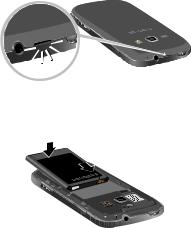
Installing the Battery
1.Remove the battery cover by pulling up on the slot provided.
2.Insert the battery into the back of the phone, making sure to align the gold contacts.
3.Replace the battery cover by aligning the cover and pressing it gently into place.
Removing the Battery
1.Turn the phone off. Removing the battery when the device is on may cause loss of stored numbers or messages.
2.Remove the battery cover by pulling up on the slot provided.
3.Lift the battery out of the device using the slot provided.
4.Replace the battery cover by aligning the cover and pressing gently until it clicks into place.
Getting Started |
7 |
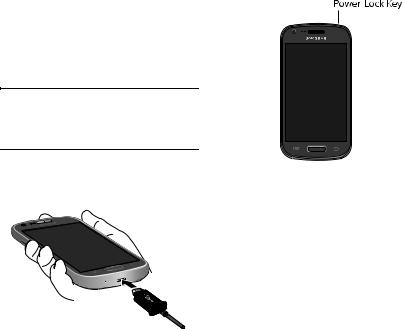
Charging the Battery
Keeping track of your battery’s power level is important. If the power level becomes too low, the phone turns off automatically, and you can lose any unsaved information.
With the Samsung-approved Li-Ion battery, you can recharge the battery before it completely runs down.
Note: The battery comes partially charged, but you should fully charge the battery before using your phone. After the first charge, you can use the phone while charging.
Connect the charger to the USB/Accessory port, then plug the Charger into an electrical outlet.
.
Turning the Phone On and Off
Turning the Phone On
Press and hold the Power/Lock Key until the phone starts up.
Turning the phone Off
1.Press and hold the Power/Lock Key until the Device Options menu displays.
2.On the Device Options menu, touch Power off.
8

Your Google Account
Your new phone uses your Google account to fully utilize its Android features, including Gmail, Google Talk and Play Store. When you turn on your phone for the first time, set up a connection with your existing Google account, or create a new Google account.
From the Home screen, touch 


 Apps
Apps
Settings Add account Google.
Your Samsung Account
Create a Samsung account, for access to Samsung apps on your phone, including S Suggest and Samsung Apps.
From the Home screen, touch 


 Apps
Apps
Settings Add account Samsung.
Displaying Your Phone Number
From the Home screen, touch 


 Apps
Apps
 Settings About device Status.
Settings About device Status.
Voicemail
As soon as your phone is activated, all unanswered calls are sent to voicemail.
Set up your voicemail and personal greeting as soon as you activate your phone.
For more information about setting up voicemail,
see “Voicemail” on page 55.
TTY Mode
Your phone is TTY-compatible, allowing you to connect a TTY device to the phone’s headset jack. Before you can use your phone with a TTY device, you’ll need to enable TTY Mode.
For more information about enabling TTY mode, see “Call Settings” on page 34.
Getting Started |
9 |

Task Manager
Your phone can run apps simultaneously, with some apps running in the background. Use Task manager to see which apps are running on your phone, and to end running apps to extend battery life. You can also uninstall apps from your phone and check memory usage.
1.From any unlocked screen, press and hold
the  Home Key, then select
Home Key, then select
 Task manager.
Task manager.
2.Touch the Active applications tab to view apps running on your phone. Touch End, or End all to close apps.
3.Touch the Downloaded tab to view information about apps you’ve installed on your phone. Touch Uninstall to remove an app from your phone.
4.Touch the RAM tab to display the amount of RAM (Random Access Memory) in use. Touch Clear memory to clear processes to increase available RAM.
5.Touch the Storage tab for internal system storage and SD card memory statistics.
6.Touch the Help tab (you may have to swipe your finger over the tabs to display the Help tab) to view information about managing RAM, and tips for extending battery life.
Securing Your Phone
Use your phone’s screen lock features to secure your phone.
To set a personal screen lock, and for other settings related to securing your phone, refer to



 Apps
Apps  Settings Lock screen.
Settings Lock screen.
Locking the phone
By default, the phone locks automatically when the screen times out.
– or –
Press the Power/Lock Key.
Tip: When the phone is locked, the Emergency call feature is available on the lock screen, to allow you to make emergency calls even while the phone is locked.
Unlocking the phone
Unlock the phone using one of the default unlock screens, or use Screen lock options for increased security.
Press the Power/Lock Key, then touch and drag your finger across the screen.
10
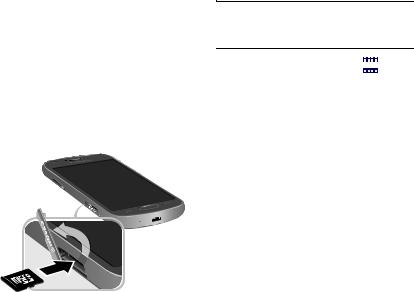
Memory Card
Your phone supports optional microSD™ or microSDHC™ memory cards (not included), for
storage of music, pictures, and other files.
Installing a Memory Card
1.Open the memory card cover, turning the cover to the side to expose the card slot.
2.With the gold contacts facing down, slide the memory card into the slot, pushing gently until it locks into place.
3.Close the memory card cover.
Removing a Memory Card
Important! To prevent damage to data stored on a memory card, unmount the card before removing it from the phone.
1.From the Home screen, touch 


 Apps
Apps
 Settings Storage Unmount SD card.
Settings Storage Unmount SD card.
2.At the prompt, read the warning and select OK to continue. Wait for SD card safe to remove to display in the Status bar and Notifications before removing the card.
3.Open the memory card cover, turning the cover to the side to expose the card slot.
4.Gently press the memory card to release the lock, then carefully pull the card out.
5.Close the memory card cover.
|
|
Getting Started |
11 |
|
|

Section 2: My Account
Before using your device, you must activate your service with Virgin Mobile. You will need your phone’s serial number (MEID), printed on a
sticker inside the battery compartment.
Create your Account and Pick your Plan
1.From your computer, visit virginmobileusa.com and click Activate.
2.Choose an activation option and click Next, then enter your ZIP code and click Next.
3.When prompted, enter the serial number (MEID) printed on a sticker inside the battery compartment.
4.Follow the instructions to choose your plan and select a payment method.
Activating Your Device
After setting up your account on virginmobileusa.com, simply turn your device on. Your device is designed to activate automatically.
If you are swapping from another Virgin Mobile device to a new one, be sure to turn off the old device before swapping the serial number (MEID). Once the MEID swap is complete, turn on the new device and the programming information will be pushed to your device automatically.
You can also start the activation process manually.
From the Home screen, touch 


 Apps
Apps
 Settings System Update Update Profile.
Settings System Update Update Profile.
Note: Do not press the Power/Lock Key during activation. Pressing the Power/Lock Key cancels the activation process.
12

Managing Your Account
From your Phone
To access your account from your phone:
From the Home screen, touch 


 Apps
Apps
 My Account.
My Account.
– or –
Dial *86.
You can:
•Check your minutes
•Add money (Top-Up)
•Change plans
•And more!
From Your Computer
Log in with your phone number and Account PIN at virginmobileusa.com.
Top-Up Your Account
Sign up for Auto Pay to keep your service working month after month. Or, you can buy TopUp cards at thousands of retailers and add money to your account from your phone or by
logging in at virginmobileusa.com.
Auto Pay
Register your credit card, debit card or PayPal account and sign up for automatic monthly payments for uninterrupted service. You can activate Auto Pay and adjust your settings anytime in My Account, or by logging in at
virginmobileusa.com.
From Your Phone
From the Home screen, touch 


 Apps
Apps
 My Account.
My Account.
–or –
Dial *729.
Additional Information
For more information about your Virgin Mobile account, as well as other Virgin Mobile services, visit us at: virginmobileusa.com.
Or, call us at 1-888-322-1122. We’re here to serve you.
My Account |
13 |

Section 3: Understanding Your Phone
Features
•Touch screen
•CDMA 1X/EV-DO Rev-A Wireless Technology
•Android® 4.1.2
•Google Play™ Store, plus pre-loaded Google apps
•Connections
–Wi-Fi
–Wi-Fi Direct
–Bluetooth
–DLNA
–USB
•Messaging Services
–Text
–Picture
–Video
–Voice
–Gmail
–Chat
•5 MP Camera/Camcorder with LED flash + 1.3 MP Front camera
•Gallery, for viewing and managing pictures and videos
•Video Player
•Music Player
•Support for optional microSD™ and microSDHC™ Memory Cards (not included)
14
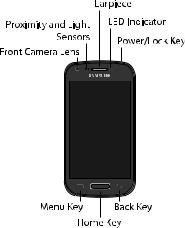
Front View
•Front camera lens: Captures pictures or video.
•Proximity and Light Sensors: Detects the presence of objects, for use with motion settings, and to control the screen display, such as when you move the phone away from your ear during a call. Detects ambient light when Automatic brightness is enabled, and when using the Front camera.
•Earpiece: Plays call sounds.
•Power/Lock Key: Press and hold to turn the phone on or off, and to access a device options menu. Press to lock the phone, or to wake the screen for unlocking.
•LED Indicator: Flashes or glows for alerts or phone status. For more information, see “LED Indicator” on page 21.
•Menu Key: Touch to display a context-sensitive menu of options for the current screen or feature. While using your phone, you may notice that the Menu Key dims, but it is always available at a touch to provide a context-sensitive menu for the current screen or app (you can set the touch key light duration, see page 103).
•Home Key: Touch to display the Home screen. Touch and hold to display recent applications or launch Task Manager. While using your phone, you may notice that the Home Key dims, but you can always use it to display the Home screen.
•Back Key: Touch to return to the previous screen or option. While using your phone, you may notice that the Back Key dims, but you can always use it to return to the previous item.
Understanding Your Phone |
15 |
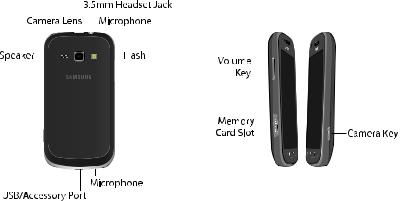
Back View |
|
|
|
|
|
|
Side Views |
||||||
|
|
|
|
|
|
|
|
|
|
|
|
|
|
|
|
|
|
|
|
|
|
|
|
|
|
|
|
|
|
|
|
|
|
|
|
|
|
|
|
|
|
|
|
|
|
|
|
|
|
|
|
|
|
|
|
|
|
|
|
|
|
|
|
|
|
|
|
|
|
|
|
|
|
|
|
|
|
|
|
|
|
|
|
|
|
|
|
|
|
|
|
|
|
|
|
|
|
|
|
|
|
|
|
|
|
|
|
|
|
|
|
|
|
|
|
|
|
|
|
|
|
|
|
|
|
•Flash: Use when taking photos or recording video.
•3.5mm Headset Jack: Plug in an optional headset or TTY equipment (not included).
•Camera lens: Use when taking photos or recording videos.
•Microphone: Capture audio during recording, during phone calls, and video chat.
•USB/Accessory Port: Connect a USB cable for charging or to sync music and files.
•Speaker: Play ringtones, call audio when in Speakerphone mode, music and media playback, and other sounds.
•Volume Keys: From the Home screen, press to adjust master volume. During calls or media playback, press to adjust volume. Press to mute the ringtone of an incoming call.
•Memory Card Slot: Install an optional memory card (not included) for additional file storage.
•Camera Key: From an unlocked screen, press and hold to launch the Camera. In Camera, press to take a picture or record video.
16
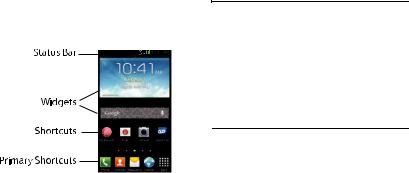
Home Screen
The Home screen is the starting point for using your phone.
•Status Bar: Presents icons to show network status, battery power, and connection details.
•Widgets: Apps that run on the Home screen. These widgets are on the Home screen by default, plus you can add your own by touching and holding on the screen for options.
•Primary Shortcuts: Provides access to your phone’s common apps.
•Shortcuts: Shortcuts to favorite apps. These shortcuts are on the Home screen by default, plus you can add your own by touching and holding on the screen for options.
Note: Unless stated otherwise, instructions in this User Manual start with the phone unlocked, at the Home screen.
All screen images in this manual are simulated. Actual displays may vary, depending on the software version of your phone and any changes to the phone’s Settings.
Understanding Your Phone |
17 |

Extended Home Screen
The Home screen consists of the Home panel, plus panels that extend beyond the display width to provide more space for adding shortcuts, widgets and folders.
Slide your finger horizontally across the screen to scroll to the left or right side panels. As you scroll, the indicator at the bottom of the display
shows your current position.
Customizing the Home Screen
Customize the Home screen to your preferences:
•Edit a Home page: Add and remove Home screen panels. Touch  Menu Edit page.
Menu Edit page.
•Display Settings: Refer to 


 Apps
Apps
 Settings Display.
Settings Display.
•Wallpaper: Touch and hold on the Home screen for options for setting wallpaper for the Home and Lock screens.
Adding and removing Home screen panels
Your phone comes with 7 Home screen panels. You can add and remove panels, up to a total of
7panels.
1.From the Home screen, touch  Menu Edit page.
Menu Edit page.
2.Use these controls to configure panels:
Remove: Touch and hold on a panel, then drag it to Remove.
Add: Touch a previously-removed panel to add it, up to the default total of seven.
Home: Marks the main Home screen page. This panel will display when you press the  Home Key.
Home Key.
Tip: You can also “pinch” the Home screen to display Edit options.
18

Navigation
Navigate your phone’s features using the command keys and the touch screen.
Warning! Please note that a touch screen responds best to a light touch from the pad of your finger or a non-metallic stylus. Using excessive force or a metallic object when pressing on the touch screen may damage the tempered glass surface and void the warranty. For more information, see “Warranty Information” on page 148.
Context-sensitive Menus
While using your phone, context-sensitive menus offer options for the feature or screen.
To access context-sensitive menus:
•Touch  Menu.
Menu.
•Touch and hold on an item.
Finger Gestures
Touch
Touch items to select or launch them. For example:
•Touch the onscreen keyboard to enter characters or text.
•Touch an item to select it.
•Touch an app’s icon to launch the application.
Touch and Hold
Activate items by a touch and hold gesture. For example:
•Touch and hold a widget on the Home screen to move it.
•Touch and hold on a field to display a pop-up menu of options.
Swipe
Swipe your finger across the screen. For example:
•Unlocking the screen
•Scrolling the Home screen or a menu
•Combine touch and hold with swipe to drag an item.
Pinch
Using two fingers, make a pinch motion on the screen. For example:
•Pinch in to zoom in on pictures or screens.
•Pinch out to zoom out on pictures or screens.
Understanding Your Phone |
19 |

Notifications
Notifications shows details about connections, alerts and other items.
1.Touch and drag downward from the top of the screen to display notifications.
2.Touch an item to open it, or to launch the related app or feature.
Tip: You can also access Notifications from the Lock screen, to easily access settings and notifications.
Clearing Notifications
1.Sweep your finger downward from the top of the screen to display Notifications.
2.Touch a notification to clear it, or touch Clear to clear all notifications.
Settings
Use settings at the top of Notifications to control popular settings.
•Wi-Fi: Turn Wi-Fi On or Off. See “Wi-Fi” on page 81.
•Bluetooth: Turn Bluetooth On or Off. See
“Bluetooth” on page 83.
•GPS: Turn GPS satellites service on or off. See “Use GPS satellites” on page 106.
•Sync: Enable or disable synchronization with your accounts.
•Screen rotation: Enable or disable the Auto rotation setting, to control whether the screen automatically updates when you rotate the phone. See “Autorotate screen” on page 102.
20

LED Indicator
The LED indicator, on the front of the phone above the screen (see “Front View” on page 15), animates or glows to show alerts or phone status.
The LED indicator only lights when the screen is off.
•Blue:
–Pulses in multi-color blue while the phone is turning On or Off.
–Blinks blue for a missed call, message or other notification.
–Blinks blue when recording voice.
•Red:
–Glows red when the phone is connected to a charger and charging.
–Blinks red when the phone is connected to a charger and there is a problem with charging.
–Blinks red when battery power is low (phone not connected to charger).
•Green:
–Glows green when the phone is connected to a charger and the battery is fully charged.
Note: You can control some LED functions at



 Apps
Apps  Settings Display
Settings Display
LED indicator.
Status Bar
The Status Bar shows network and battery status and other details, including these common icons.
Airplane Mode Active: All wireless communications are disabled. See
“Airplane mode” on page 94.
USB Connected: The phone is connected to a computer using a USB cable. For information about transferring data between your phone and a computer, see
“Transferring Data” on page 87.
Voice Call: A voice call is in progress.
Speakerphone: Speakerphone is enabled.
Missed Call: Displays when there is a missed call.
Mute: Voice or playback volume is muted.
Battery Level: Shown fully charged.
Battery Charging: Battery is charging.
DevicePowerCritical:Batteryhasvery little power remaining. Charge immediately.
Understanding Your Phone |
21 |

3Gconnection: Phone is active on a 3G system. The arrows are colored when data is being transferred.
Signal Strength: Current signal strength. The greater the number of bars, the stronger the signal.
Wi-Fi Active: Wi-Fi is active, and connected to a Wi-Fi network. The greater the number of rays,
the stronger the signal. The arrows are colored when data is being transferred. For more information about configuring Wi-Fi, see “Wi-Fi” on page 81.
Wi-Fi Action Needed: Action needed to connect to Wi-Fi network. For more information about configuring Wi-Fi, see “Wi-Fi” on page 81.
New Message: You have new message(s).
New Voicemail: You have new voicemail. A number indicates the number of new messages.
New Email Message: You have new email.
Download Successful: A file was downloaded successfully.
Update Available: An update is available for an installed app.
Update Successful: An update was installed for an app.
Alarm: An alarm is set.
Silent profile: All sounds except media and alarms are silenced, and Vibrate is not active.
Vibrate: Vibrate profile is active. See “Sound” on page 98.
Music Playing: Music is playing, but the app is in the background. You can control playback from Notifications, or from Music player.
Music Paused: Music playback is paused. You can control playback from Notifications, or from Music player.
SD Card Ready: A memory card scan is underway, to prepare the card for use. For more information about using memory cards, see “Memory Card” on page 11.
22

SD Card Safe to Remove: A memory card was unmounted, and it is safe to uninstall it. For more information about using memory cards, see
“Memory Card” on page 11.
SD Card Removed: A memory card was uninstalled. For more information about using memory cards, see “Memory Card” on page 11.
Bluetooth Active: Bluetooth is turned on. For more information, see
“Turning Bluetooth On or Off” on page 84.
BluetoothPaired: Your device is paired with another Bluetooth device. For more information, see “Pairing with a Bluetooth Device” on page 84.
TTY: TTY Mode is active.
Primary Shortcuts
Primary Shortcuts appear at the bottom of the display. You can edit the Primary Shortcuts,
except for 


 Apps.
Apps.
Adding or Removing Primary Shortcuts
Touch and hold a shortcut, then drag it from the Primary Shortcuts to the Home screen, or from the Home screen to the Primary Shortcuts.
Understanding Your Phone |
23 |

Widgets
Widgets are self-contained applications that you
can place on the Home screen for quick access.
Adding widgets from the Home screen
1.Navigate to a Home screen panel, then touch and hold on the screen to display the
Home screen menu.
2.Touch Apps and widgets.
3.Touch the Widgets tab, then touch and hold on a widget to place it on the Home screen.
Adding Shortcuts from Widgets
1.Navigate to a Home screen panel.
2.Touch 






 Apps, then touch the Widgets tab.
Apps, then touch the Widgets tab.
3.Touch and hold on a widget to place it on the Home screen.
Removing Widgets
Touch and hold the widget until
 Remove appears, then drag the widget
Remove appears, then drag the widget
to the Remove icon.
Shortcuts
Use App shortcuts for quick access to applications from the Home screen. Your phone comes with app shortcuts already placed on the
Home screen, and you can add your favorites.
Adding shortcuts from the Home screen
1.Navigate to a Home screen panel, then touch and hold on the screen to display the
Add to Home screen menu.
2.Touch Apps and widgets.
3.Touch an app, then follow the prompts to configure the shortcut and add it to the Home screen
Adding Shortcuts from Apps
1.Navigate to a Home screen panel.
2.Touch 






 Apps.
Apps.
3.Touch and hold on an app until it appears on the Home screen.
Removing Shortcuts
Touch and hold the shortcut until
 Remove appears, then drag the
Remove appears, then drag the
shortcut to the Remove icon.
24

Folders
Place folders on the Home screen to organize
items.
Adding Folders
1.Navigate to a Home screen panel, then touch and hold on the screen to display the
Home screen menu
2.Select Folder to create a folder on the Home screen. Touch the folder to name it.
Removing Folders
Touch and hold the folder until
 Remove appears, then drag the folder to the Delete icon.
Remove appears, then drag the folder to the Delete icon.
Wallpaper
Choose a picture to display in the background of the Home screen. You can choose from preloaded wallpaper images, or select a picture you’ve taken with the Camera or downloaded.
1.From the Home screen, touch and hold on the screen to display the Home screen menu, then select Set wallpaper.
2.Select Home screen, Lock screen, or Home and lock screens.
3.Choose a source:
•Gallery: Choose a picture stored on your phone or on an optional installed memory card. Touch a picture to select it, then use the crop tool to resize the picture, if desired. Touch Done to set the picture as wallpaper.
•ID Wallpapers: Choose a wallpaper from your downloaded ID Pack(s).
•Live wallpapers: Choose from pre-loaded interactive moving wallpapers. Touch a wallpaper, then touch Set wallpaper.
•Wallpapers: Choose from pre-loaded wallpaper images. Touch a wallpaper, then touch Set wallpaper.
Note: You can also set Wallpaper in Settings. For more information, see “Wallpaper” on page 101.
Understanding Your Phone |
25 |

Apps
Apps holds all applications installed on your phone. Applications that you download and install are also added to Apps.
The Apps screen is like the Home screen, it consists of panels that extend beyond the display width to provide more space. Slide your finger horizontally across the screen to scroll to the left or right side panels. As you scroll, the indicator at the bottom of the display shows your current position.
For more information about applications, see
“Applications” on page 58.
You can place shortcuts to apps on the Home screen, for quick access to the app. For more information, see “Adding Shortcuts from Apps” on page 24.
1.From the Home screen, touch 






 Apps.
Apps.
2.Slide your finger left or right to scroll the Apps screens.
3.Touch an icon to launch the application.
Entering Text
Your phone uses a virtual QWERTY keyboard for text entry. Use the keyboard to enter letters, punctuation, numbers, and other characters into text entry fields or applications. Access the keyboard by touching any text entry field.
You can also use voice input to speak your inputs.
The virtual QWERTY keyboard displays at the bottom of the screen. By default, when you rotate the phone, the screen orientation updates to display the keyboard at the bottom of the screen.
26
